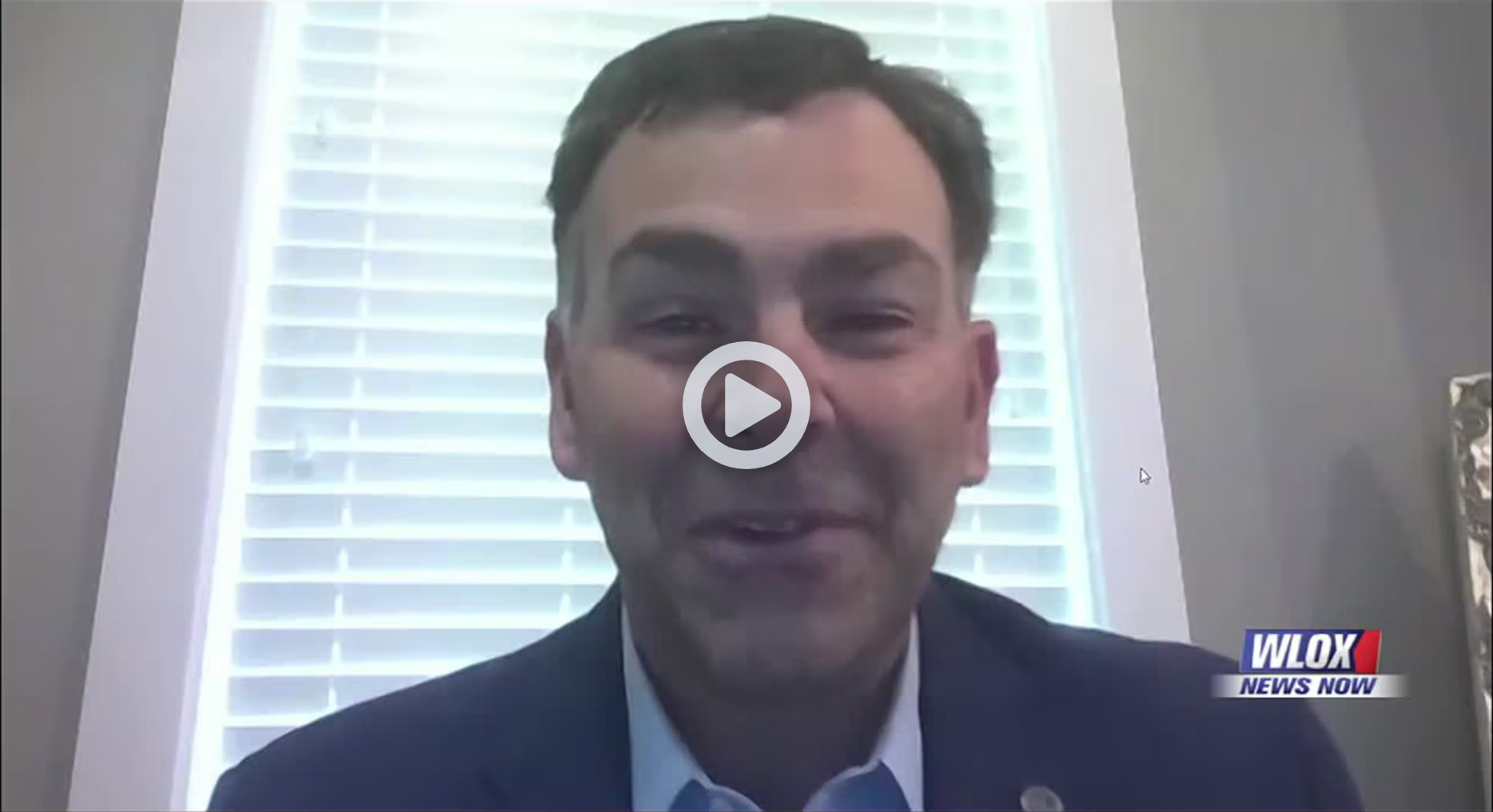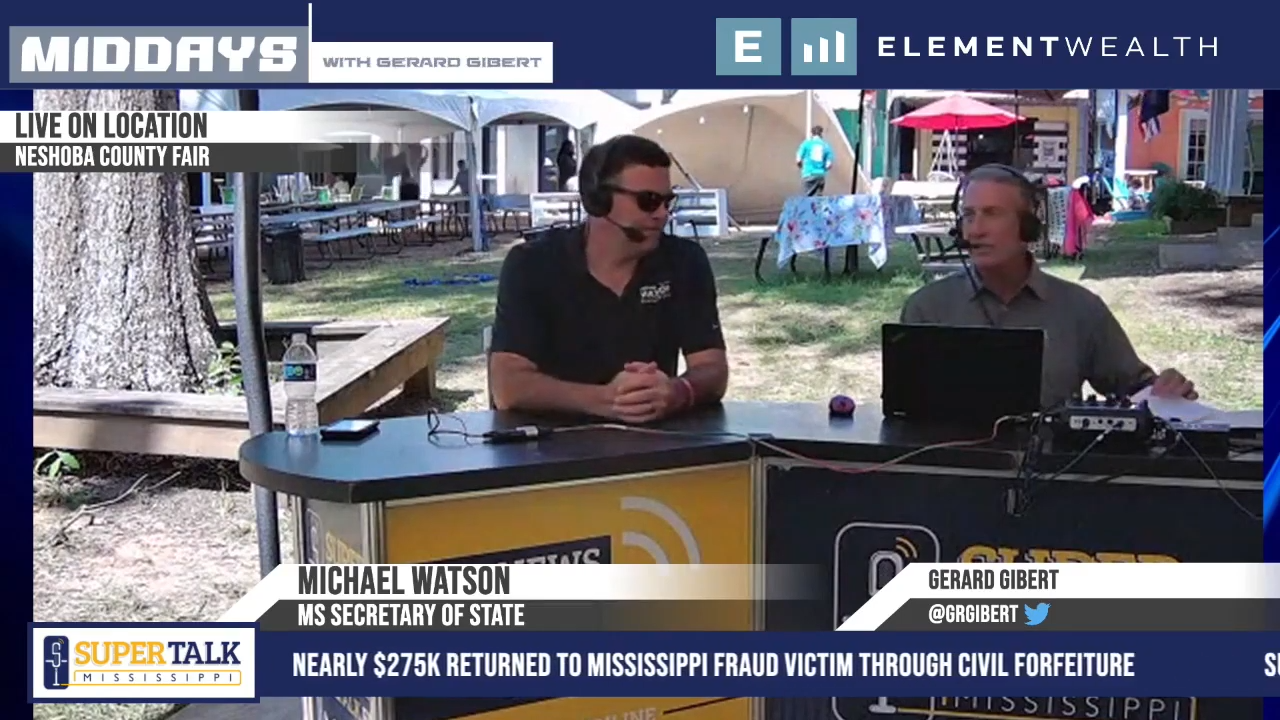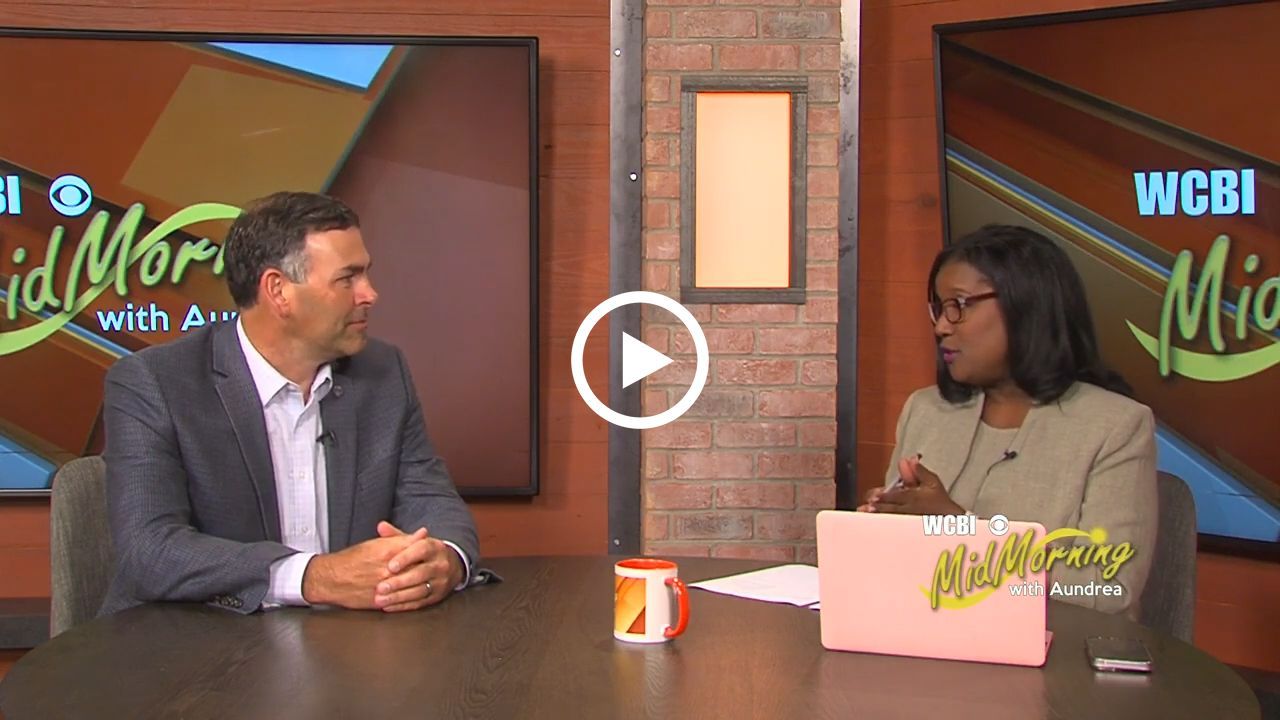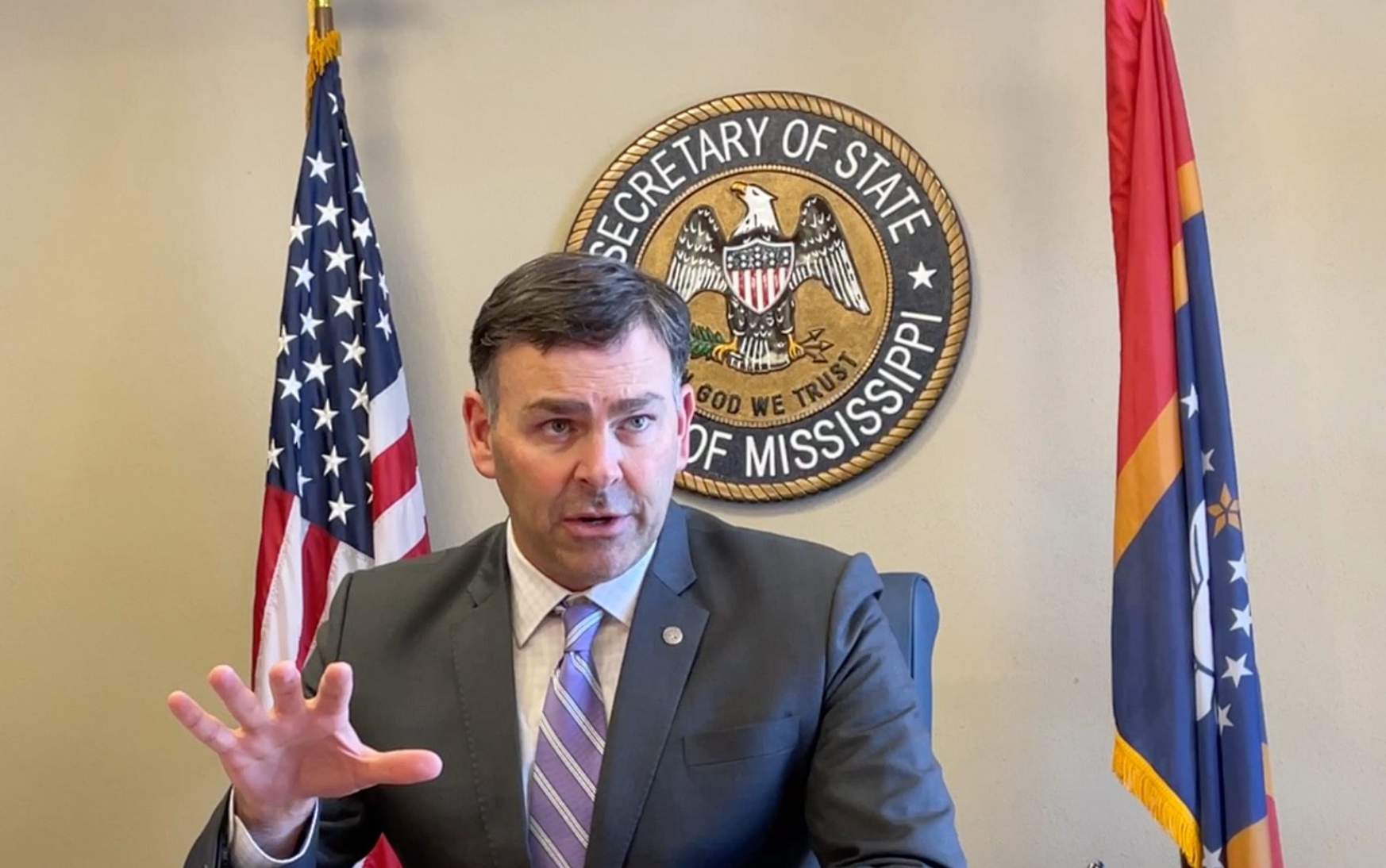
(Magnolia Tribue) –Mississippi Secretary of State Michael Watson is taking the “if at first you don’t succeed, try again” approach to a package of campaign finance reforms this session, after a similar effort failed to garner support last legislative session.
During a press conference held late last week, Watson said he will ask legislators this year to enact even more stringent reform than last year.
This year’s proposal would mandate state, county, and local office seekers to electronically file their finance reports on a user-friendly, searchable data system on the Secretary of State’s website.
Currently, candidates can report their campaign contributions via handwritten forms submitted as PDF files. A PDF is far from ideal, Watson said, as some finance forms come in as unreadable.
The online system could be up a running by 2026, Watson said, noting legislative approval is needed.
Watson did not disclose a price tag for the system, but noted that when the system is operational, candidates would file their campaign finance report with the local clerk’s office and the Secretary of State’s office, which would place the document online.
Watson said the Jackson bribery scandal being prosecuted in the state’s capital city “is a perfect example” of how the system is not working.
Jackson Mayor Chokwe Lumumba, who has been indicted by federal prosecutors, has not filed a campaign finance report since 2021, according to his own admission last week.
Mississippi Code § 23-15-811 states that persons who fail to file campaign finance disclosures “shall be guilty of a misdemeanor and upon conviction shall be punished by a fine in a sum not to exceed Three Thousand Dollars ($3,000.00) or imprisoned for not longer than six (6) months or by both fine and imprisonment.”
The statute goes on to note that, “No candidate who is elected to office shall receive any salary or other remuneration for the office until he or she files all reports required by this article that are due as of the date the salary or remuneration is payable.”
The law also disqualifies a candidate who has not filed campaign finance reports from the ballot.
While Secretary Watson did not mention Mayor Lumumba by name, he did say, “I’ve had a lot of questions about the issue here in Jackson where a certain individual wasn’t filing his reports and wasn’t being caught because there was no mechanism there.”
Watson told reporters that cities are to send the campaign finance reports to the Secretary of State’s office.
“They don’t, often times. We get them rarely. But it would make that very clean. Everyone has to follow the same system,” Watson said.
He told reporters that some at the Capitol have expressed concern that areas in their districts lack a reliable internet connection. Yet, the Secretary said the state has made great strides in connecting its citizens and does not see it as a problem.
Currently, campaign finance laws outline that reports must be filed annually by January 31. However, any penalties for failing to file lack teeth. Watson said the new law he’s proposing would impose fines on offenders, and each time a candidate violates the law, the fine will get larger.
Secretary Watson said the system would streamline campaign finance reporting.
“I think if [candidates] got a statewide system, everybody’s on the same playing field, you’ve got a clear mechanism for enforcement,” Watson said. “Whose job is what? What is the penalty? What is the fee? What is this? It just makes it easier.”
“Everyone in state government would be on the same process,” he added.
During his half-hour press conference, Watson also addressed election integrity, telling reporters that in their first match with Alabama, some 8,000 double registrants were found. He said these individuals were registered to cast ballots in both states.
Mississippi signed memorandums of understanding with Alabama, Tennessee, and Arkansas to ensure voters were not double registered in those states, the Secretary said. His office is working with Florida and Georgia on similar MOUs.
The idea that a person is on the voter rolls in two states may seem minor to some. However, Watson said, “it is illegal.”
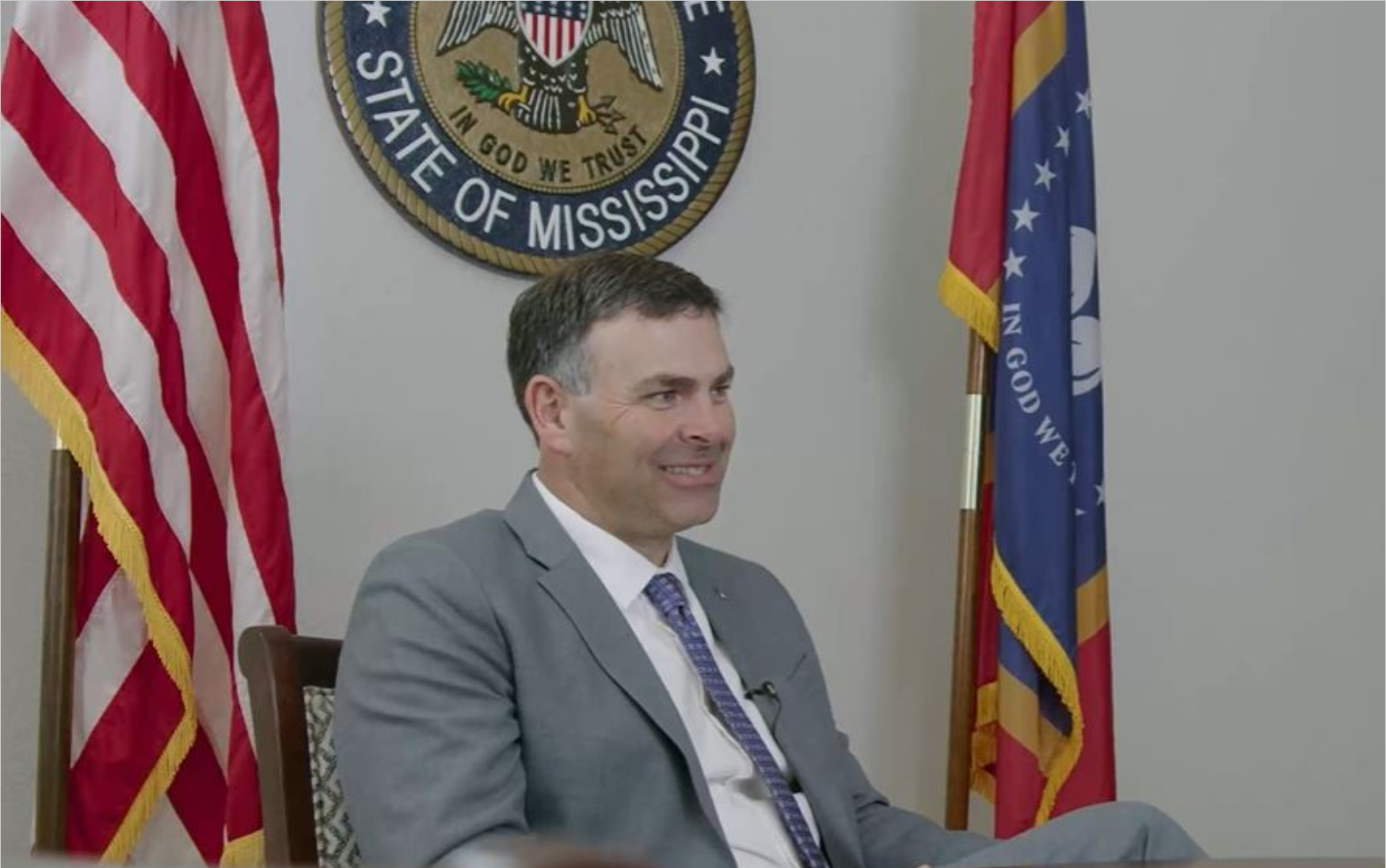
While this year’s legislative session is full steam ahead and our office continues to promote the implementation of new security measures for Mississippi elections, it’s important to pause and provide an update on the status of safeguards employed from previous sessions.
Through House Bill 1310 (passed during the 2023 Legislative Session), our office and county election commissioners were provided with definitions for functions and processes we may utilize to conduct voter roll maintenance (VRM) beginning January 1, 2024. Having completed a full year of application, I’m excited to report on these efforts.
Working with the U.S. Election Assistance Commission, we launched a pilot program in Lafayette County using information from Experian®, which utilizes information from the USPS and commercially available data, to identify voters who have moved from their place of registration. Prior to H.B. 1310, our office solely relied on post office and/or other government data for conducting VRM. Under the new law, counties may use any reliable information available to determine if a voter has moved within or outside of the state.
Accessing commercial data, like Experian’s, is the first of its kind in Mississippi. With the success of the pilot program, we are excited to announce we have just signed a contract to institute this new resource in all 82 counties.
In an effort to further expand resources without added cost, our team reached out to neighboring states to sign memorandums of understanding (MOU) for data exchanges. Tennessee, Arkansas, Louisiana, Alabama, Florida, and, most recently, Kentucky have all signed MOUs while the data exchange with Alabama has already taken place.
In reviewing the data from Alabama, over 8,000 names were found to be registered in both Alabama and Mississippi. While this act itself is not illegal, it would be illegal for one person to cast a ballot in both states. In short, there was the potential for 8,000 illegal votes to be cast. We were able to communicate this information to local county officials to take action. Because many of Mississippi’s local races require plurality, just one vote may change an election.
Finally, I want to thank each of you for supporting our office’s efforts to continue securing Mississippi elections. Through your emails, calls, text messages, etc., we are able to voice your concerns when communicating with our state legislature. As a reminder, I encourage you to continue holding elected officials accountable even after the passage of meaningful legislation. Should you have further questions about our efforts, please reach our office at secretary@sos.ms.gov.
MICHAEL WATSON
Secretary of State
State of Mississippi
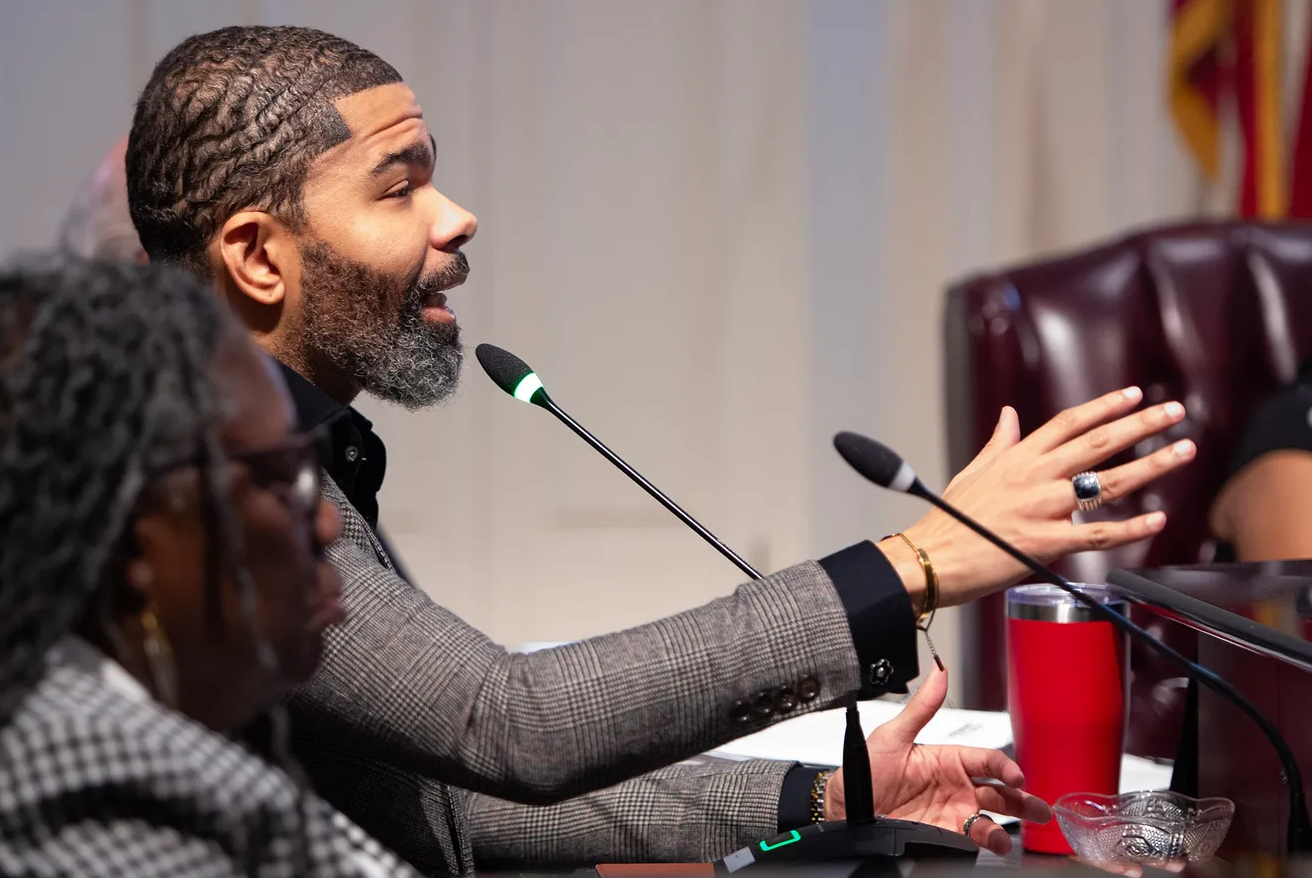
The Attorney General's Office, headed by Lynn Fitch, recently told the Clarion Ledger the state’s campaign finance enforcement laws are confusing, difficult to understand and ultimately difficult to enforce because there are several state agencies involved before the AG can see a case. If that even happens, the punitive measures are minor at best, AG Chief of Staff Michelle Williams said.
"The current system for assessing penalties for failing to timely file reports is broken,” Williams said. “It requires work by three agencies — possibly four for a municipal election — and the Attorney General’s Office is in every instance the last step, requiring notification by another agency to trigger our part. In addition, the misdemeanor prosecution and $500 in civil penalties are too light to deter bad behavior. And the many grace periods allowed for curing a delinquent report can push action against a tardy candidate until after the election. General Fitch is hopeful that this year the Legislature will take up the campaign finance reform package she has put forward for the past two years to close the gaping holes in the system, streamline enforcement of its provisions, and improve transparency."
While Mississippi's campaign finance laws spell out punishments and penalties for office-holders or candidates who don't file annual campaign finance reports, the laws do not state what official or agency is in charge of holding politicians accountable for failure to file. It begs the question: how are campaign finance laws supposed to be enforced in Mississippi if no one is monitoring to ensure the laws are followed? It's like having laws, but no police force.
For Lumumba, the mayor hadn't filed a report since 2021 until the end of January when he submitted reports for 2022, 2023 and 2024 ahead of qualifying for his reelection bid for 2025. For those who hold public office, campaign finance reports are required to be filed annually.
The fact that Lumumba hadn't filed a report in three years is a clear violation of state law, but yet he was not investigated, penalized or prosecuted for those missed reports. Moreover, Lumumba's missed reports were seemingly not an issue or even known to the wider public until he was federally indicted on bribery charges in November. Lumumba is accused of accepting $50,000 in bribes disguised as "campaign contributions" from undercover FBI agents.
Since then, Lumumba has refused to answer any questions about his campaign finances or why he missed submitting the annual reports, saying only that it is related to his indictment "and so I will not speak to it."
According to Mississippi law, two potential routes for prosecution for those who have committed campaign finance violations are through a state district attorney’s office or through the Mississippi Ethics Commission, which then notifies the Mississippi Attorney General's Office. Both are long, winding processes that could potentially take months — an issue the Attorney General's Office has said needs to be corrected.
In Lumumba’s case, the District Attorney that could potentially prosecute him for campaign finance violations is Hinds County District Attorney Jody Owens — the same man who was indicted along with Lumumba and is accused of helping to facilitate bribes to the mayor and two other members of the Jackson City Council. This would be a clear conflict-of-interest for Owens. His office has also not indicated it is moving in that direction.
Jackson, Mississippi Secretary of State spar over who's in-charge of enforcement
In a recent statement to the Clarion Ledger, Mississippi Secretary of State Michael Watson said his office has “limited authority to impose civil penalties (fines) for failing to file reports,” because the secretary of state's offices' oversight “only extends to state district and statewide candidates and PACs supporting those candidates.”
“We cannot impose a fine on a county or municipal candidate,” Watson said. “Actions which can be taken regarding municipal candidates, such as withholding payment or charging with a misdemeanor, can only be made at the city level or by the county prosecutor, respectively. Our office does not have enforcement authority for municipal candidates, but those that do failed to act.”
Watson is correct that one penalty for office-holders is to withhold their salary, but the law does not spell out who would be in charge of doing that. It’s unclear if that is a power of the Jackson City Council, which controls the city’s finances, or if that would be another city department. In any case, all city department directors report to Lumumba.
After receiving Watson's statement, the Clarion Ledger asked Jackson's Municipal Clerk Angela Harris why Lumumba's missed campaign finance reports for the past three years were never reported to the secretary of state. Harris' municipal clerk office is where all campaign finance reports are submitted in Jackson.
Jackson's City Attorney Drew Martin responded in an email that there was no law that requires Harris to report candidates who do not submit their campaign finances, but only that a municipal clerk "forwards copies of all reports it receives to the Secretary of State." Elizabeth Johnson, the communications director for the secretary of state, confirmed that Harris had previously sent in other candidates' campaign finance reports that were submitted.
"There is no statute or rule which directs or authorizes the municipal clerk to maintain a list of candidates who do not file campaign finance forms, nor is there any statute or rule which directs or authorizes the municipal clerk to report candidates who do not file reports — not to the Secretary of State nor to anyone else," Martin said.
Will Mississippi's lawmakers finally address the gaps in campaign finance laws?
For the past two years, both Watson and Fitch have urged lawmakers to pass campaign finance reforms and to add “teeth” to campaign election violation enforcement. In 2024, bills filed to address those concerns died by legislative deadlines.
It should be noted that every lawmaker within the Mississippi Legislature — since they are elected officials — is required by law to file annual campaign finance reports. So essentially, campaign finance reform bills are asking lawmakers to police themselves.
That being said, this year several reform bills were filed and are being worked through the legislative process. Whether they make it through and become law is still yet to be seen as lawmakers are still working their way through the 2025 session.
Both the House and Senate have moved forward legislation to address campaign finances and elections in general.
Original Story
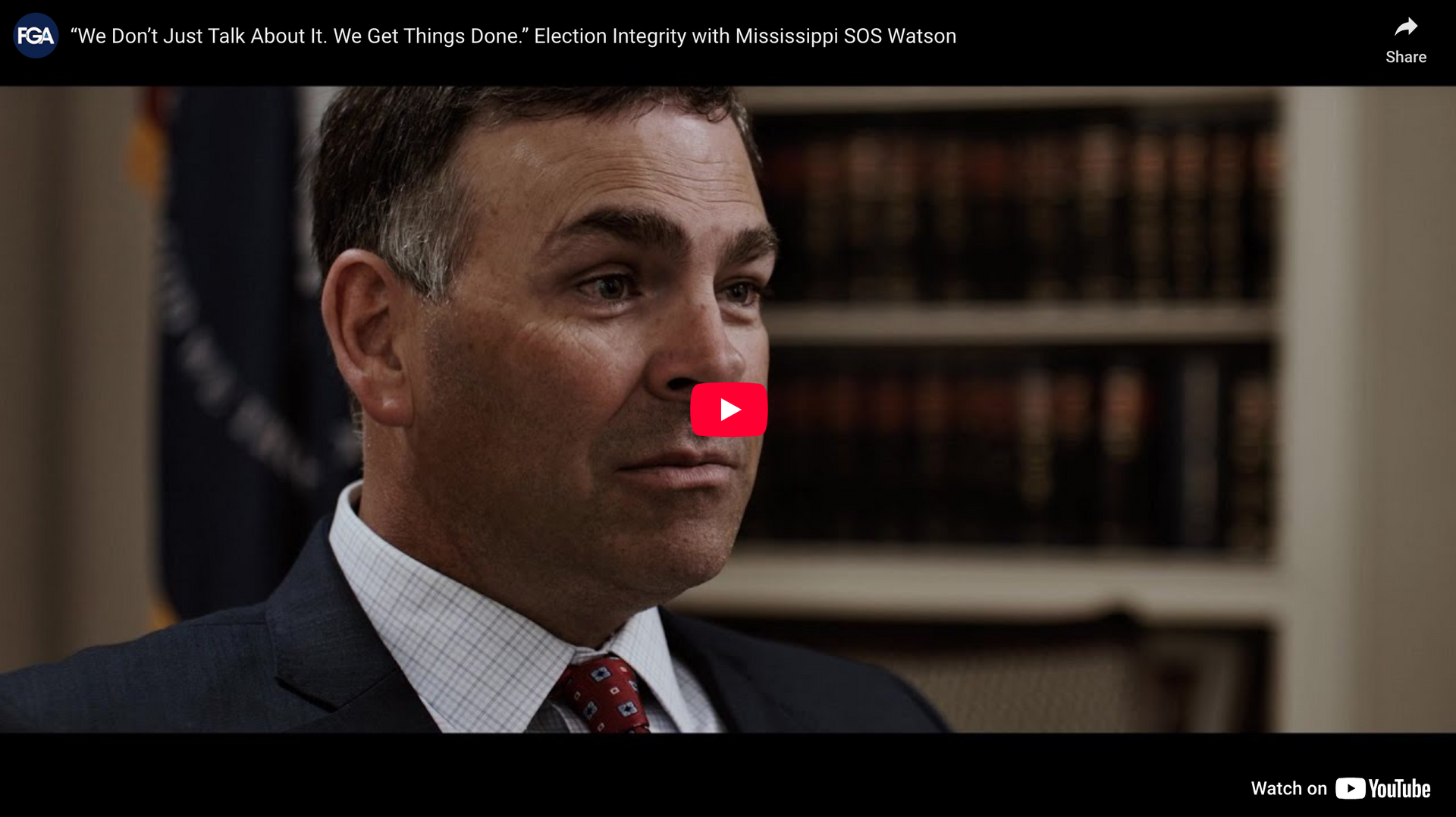
Learn more about FGA reforms to safeguard our elections here.
Original Story
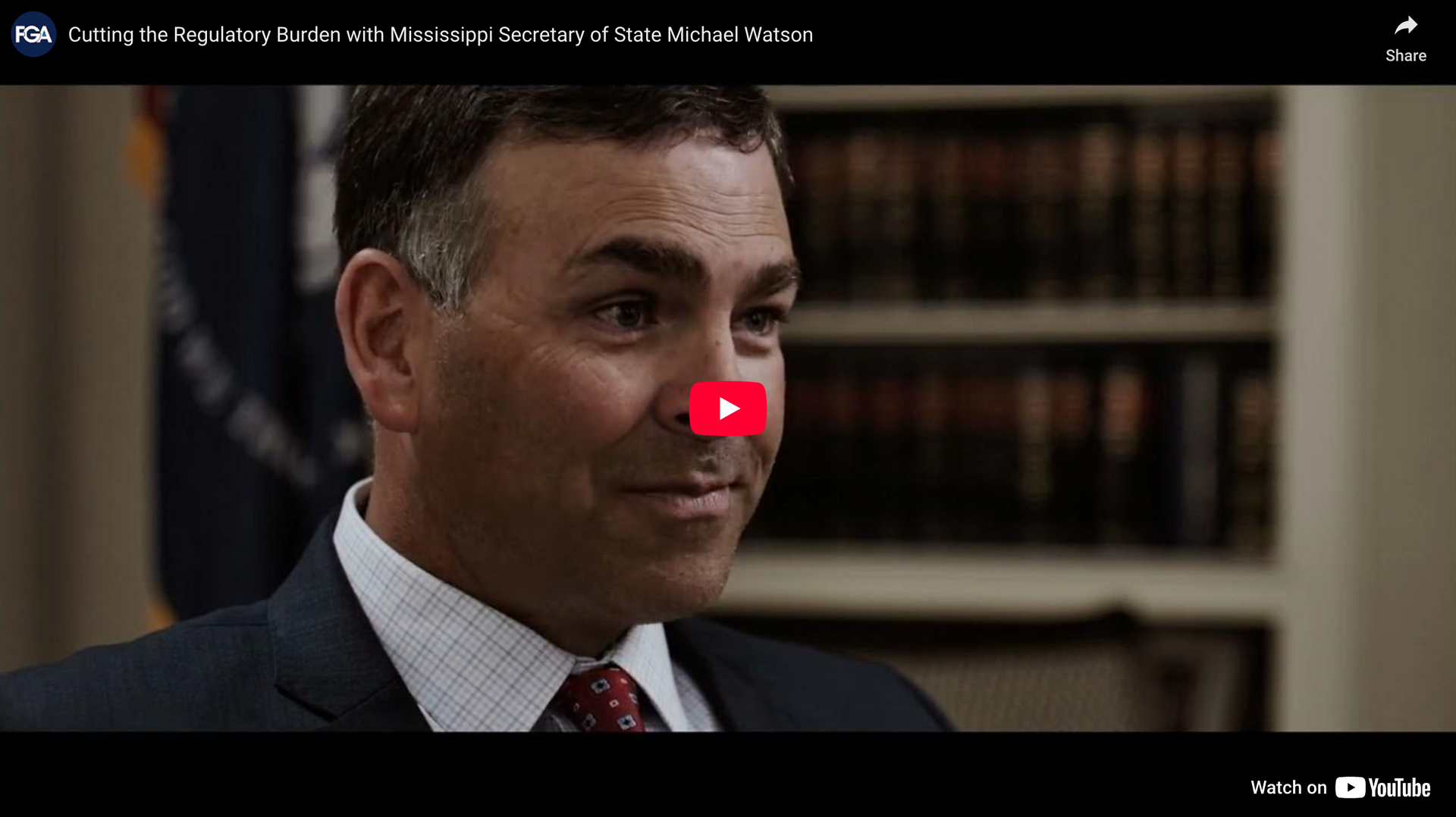
Watch to see what he deems “drops of prosperity,” and read more about how FGA is fighting for limited government here.
Original Story
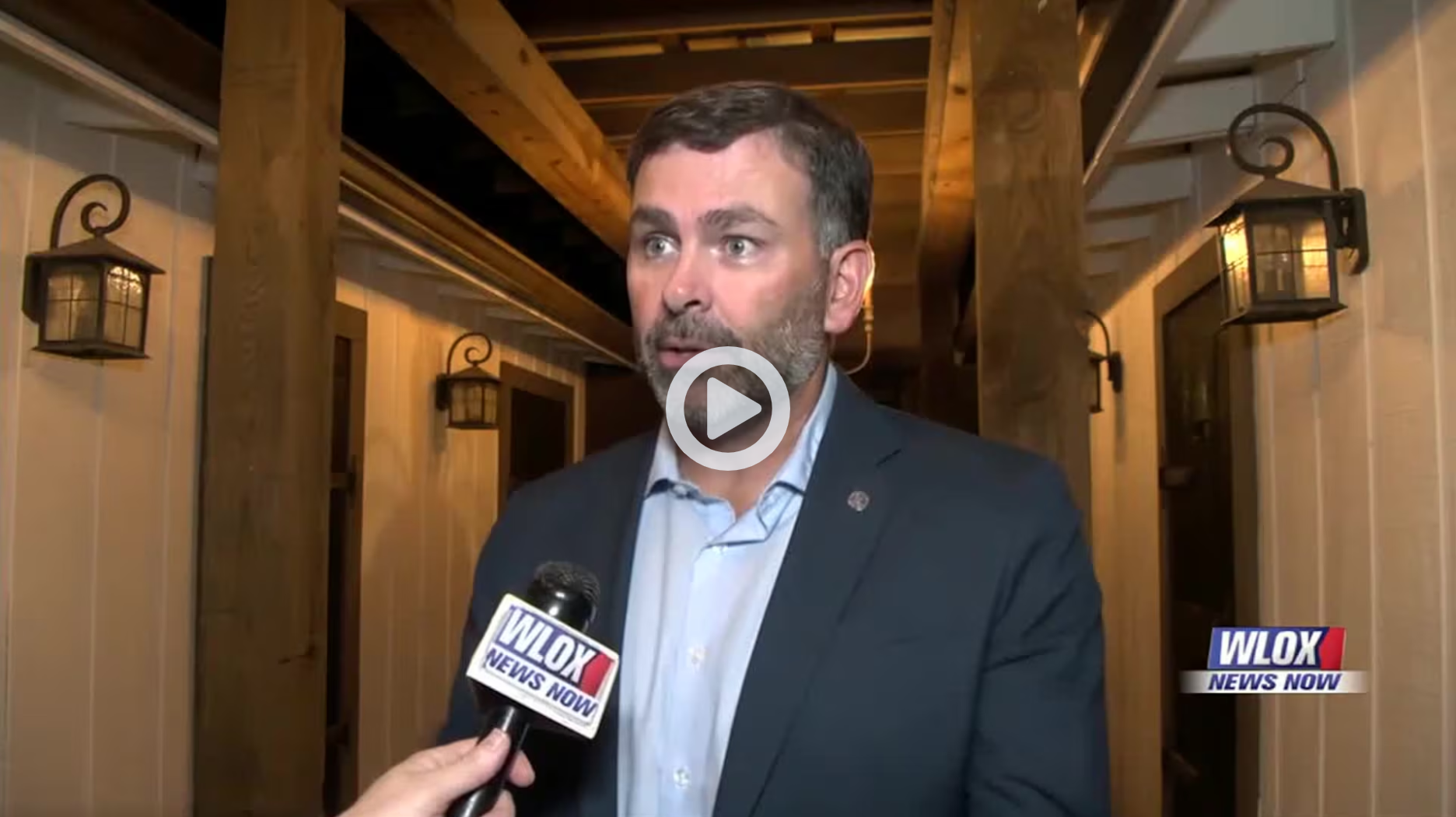
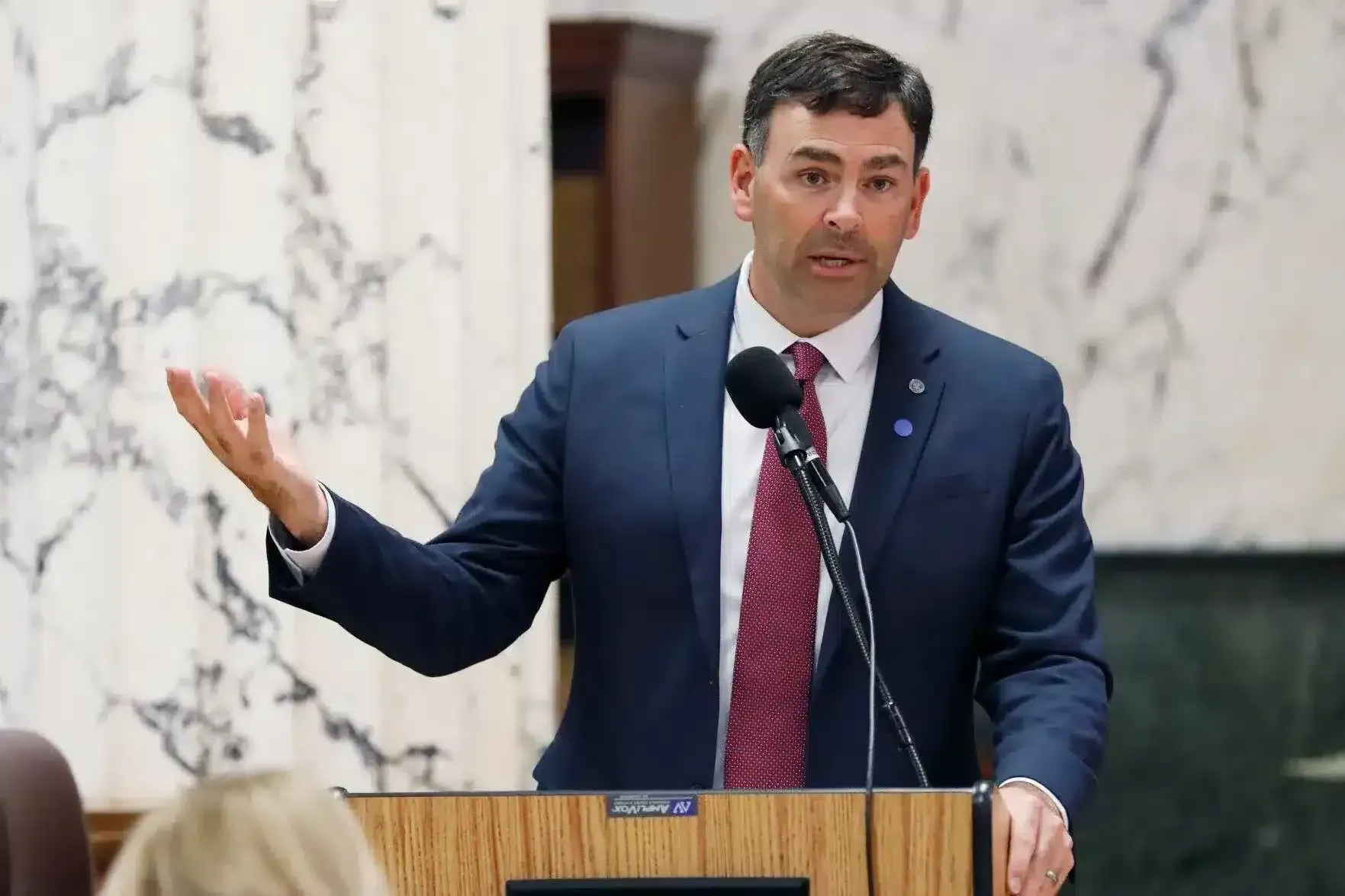
( SuperTalk) - With just over two weeks until Election Day, Mississippians are gearing up to cast their ballots for several statewide elections and a contentious presidential election. Mississippi Secretary of State Michael Watson wants voters to know the election process is safe in the Magnolia State.
Although government, court, and other third-party research shows that voter fraud is extremely rare, a nationwide NPR poll says 6 in 10 Americans are concerned about interference that could influence the upcoming election. Watson vouches that his office, along with the state legislature, has added every possible safeguard to protect election integrity.
“I hate when people say, ‘You’re just trying to make it hard on people to vote.’ No, we aren’t,” Watson said during an appearance on MidDays with Gerard Gibert . “We’re trying to follow the law and make sure there’s integrity in the process. That’s what we’re doing.”
Among those safeguards include a dual-verification process, the first step of which is called DPS Verify , for voter registration and partnerships with five other southeastern states to compare and verify voter rolls. Additionally, the legislature banned ballot harvesting in the state, which is the gathering and submitting of absentee or mail-in ballots by third-party individuals.
“One of the things that I’ve tried to tell Mississippians is, ‘You can rest assured that we have a great process here,'” Watson continued. “There won’t be questions. And thank the Lord, a lot of people kind of laugh at this, that we aren’t one of those that will be in the crosshairs on election night.”
Watson, who will also aid other secretaries of state on election night as the incoming president of the National Association of Secretaries of State, encouraged voters to hold their local election officials accountable. One way to do that, according to Watson, is to check voter roll numbers on the secretary of state office’s website – data which is updated monthly.
“I’m really comfortable with where we are,” Watson said. “I think we’ve done a great job and appreciate the legislature’s help.”
Other state officials, such as leaders from the U.S. Attorney’s Office, are also making citizens aware that they will emphasize both voter safety and election legitimacy on and after November 5.
“Every citizen must be able to vote without interference or discrimination and to have that vote counted in a fair and free election,” U.S. Attorney Todd Gee said. “Similarly, election officials and staff must be able to serve without being subject to unlawful threats of violence. The Department of Justice will always work tirelessly to protect the integrity of the election process.”
Gee noted in a press release that Mississippians should be vigilant in reporting potential fraud or voting rights concerns, which can be done by contacting Assistant U.S. Attorneys Bert Carraway and Samuel Goff at 601-973-2826 or 601-973-2855 on Election Day. The FBI will also have special agents available in local field offices throughout the country to receive allegations of fraud and other election abuses.
In addition, the FBI will have special agents available in every field office throughout the country to receive allegations of election fraud and other election abuses on Election Day. The Mississippi FBI field office, located in Jackson, can be reached by the public at 601-948-5000.

Magnolia Tribune– With less than three weeks until the presidential election, the Mississippi Secretary of State’s office along with local elected election commissioners and circuit clerks are working to reassure voters who may be concerned with election security and the validity of their vote in the Magnolia State.
Lawmakers passed the Mississippi Voting Modernization Act in the 2022 legislative session, providing grant funding for counties to replace touchscreen voting machines with approved machines that scan paper ballots. The goal, as stated at the time, was to ensure the security of the voting process utilizing paper ballots, therefore leaving a paper trail. Previous touchscreen machines did not always provide a paper record of the vote.
Now, after they present valid identification and sign the voter roll, Mississippi voters are handed a paper ballot that is to be marked with a pen before placing it in a scanning machine. The scanned ballot is then shown on the screen for verification by the voter before the paper ballot is placed inside a secure portion of the machine for auditing purposes.
Secretary of State Michael Watson told Magnolia Tribune that under the modernization act, counties were provided a list of three approved vendors to purchase voting equipment. Before grant funding was approved, each county had to submit documentation for review to ensure the equipment met the necessary requirements.
The deadline to purchase and put the new machines into use was January 1, 2024, meaning voters who cast a ballot in a Primary Election this year would have already seen the new machines in use.
Several regulations were put in place concerning the type of machines counties could purchase in an effort to prevent hacking. For instance, machines that have “wireless remote connections” are prohibited. In addition, the use of pre-scored punch cards is not allowed.
“A machine could not have a modem or some other device installed that allowed access to the Internet,” Watson clarified.
Secretary Watson said approved machines have built-in security measures that prevent tampering, such as attempts to sideload malicious software via a USB thumb drive.
“It would be incredibly difficult for a person to tamper with any voting machines. There are multiple layers of security, testing, and protections that cannot be discussed for security reasons,” Watson said.
Local election controls
On the local level, each county elects their own set of election commissioners to oversee each election. Some of their duties include training poll workers and conducting regular accuracy tests on the voting machines prior to Election Day.
The Secretary of State’s Office provides election commissioners with annual certification training to ensure they are complying with the various requirements under Mississippi election laws.
“In addition to this annual training, the Mississippi Secretary of State’s Office provides summer workshop trainings and weekly conference calls in the lead up to the election,” Watson explained.
Secretary Watson said he has full confidence in those on the local level to ensure elections are conducted securely.
“Our circuit clerks and election commissioners are the unsung heroes when it comes to elections in Mississippi, and the post-elections audits provides a vehicle for praising their successes,” Watson added.
Auditing election results
Another layer of security came with the passage of HB 1310 during the 2023 legislative session. The law provides the Secretary of State’s office with the ability to audit election results and procedures.
Secretary Watson said the law gives his office another means to ensure elections are being held according to state law by holding election officials on the local level to an increased level of accountability as implemented by the Secretary of State.
“Any missteps will turn into opportunities for an additional level of training and dialogue on the results,” Watson said.
In the digital age, there is a need to ensure other aspects of the voting process are also secure. As such, Watson’s office has invested in cybersecurity systems and training. By working with the Legislature, Election Support Funds were made available to counties for cybersecurity improvements.
“Our office is always looking at what other states are doing and brainstorming amongst ourselves to further ensure the integrity and security of our elections,” Watson said. “That said, we have been extremely aggressive over the last four and a half years making as many improvements as possible. I couldn’t be more proud of our team and am thankful the Legislature has passed most of our election integrity legislation.”
Changes on the horizon?
During the 2024 legislative session, discussions on allowing in-person early voting and first-time online voter registration were hot topics. Those debates have continued in recent hearings.
Early voting was proposed by State Senator Jeremy England (R). Under his bill, early voting would have been allowed for 15 days prior to an Election Day, excluding Sundays and ending the Saturday before the scheduled election. The measure would have eliminated in-person absentee voting, but mail-in absentee voting would still have been accessible.
Currently in Mississippi, voters can vote 6 weeks prior to Election Day. This election year, that meant as early as September 23.
READ MORE: Lawmakers hold joint hearing on early voting, online voter registration
As a security measure, Senator England’s bill would have required the voter to show a valid ID to participate in early voting, the same requirement currently used for absentee voting and voting at the polls on Election Day.
Secretary Watson said his office supports closing the current window absentee voting provides.
“We are advocating for the tightening of the absentee window to 30 days and the reduction of absentee options if early voting is implemented,” Watson told Magnolia Tribune. “We are always looking at opportunities to make the process better and even more secure.”
First-time online voter registration would allow a person who is currently not registered to do so online, negating the need to do so in person at their local circuit clerk’s office. During a recent hearing on the proposed changes, lawmakers were told that if implemented, first-time online registration could provide cost savings in reduced paper expense and lead to a reduction in data entry errors.
Due to the proliferation of the internet and smartphones, offering first-time online voter registration was also touted as a vehicle to entice more young adults to register.
To Secretary Watson, any impact the implementation of early voting and/or first-time online voter registration would have on the security of the election process in Mississippi would be down to the policies implemented by the Legislature and signed off on by the Governor.
“While we have seen proposals for how it would work in Mississippi, until a process has been put into law, we cannot speculate as to what kind of effect it could have on election security in Mississippi,” Watson added.
He reminds Mississippi’s voters that while first-time online registration is not currently available, those who have registered in-person at their local circuit clerk’s office can update their information by way of his office’s website.
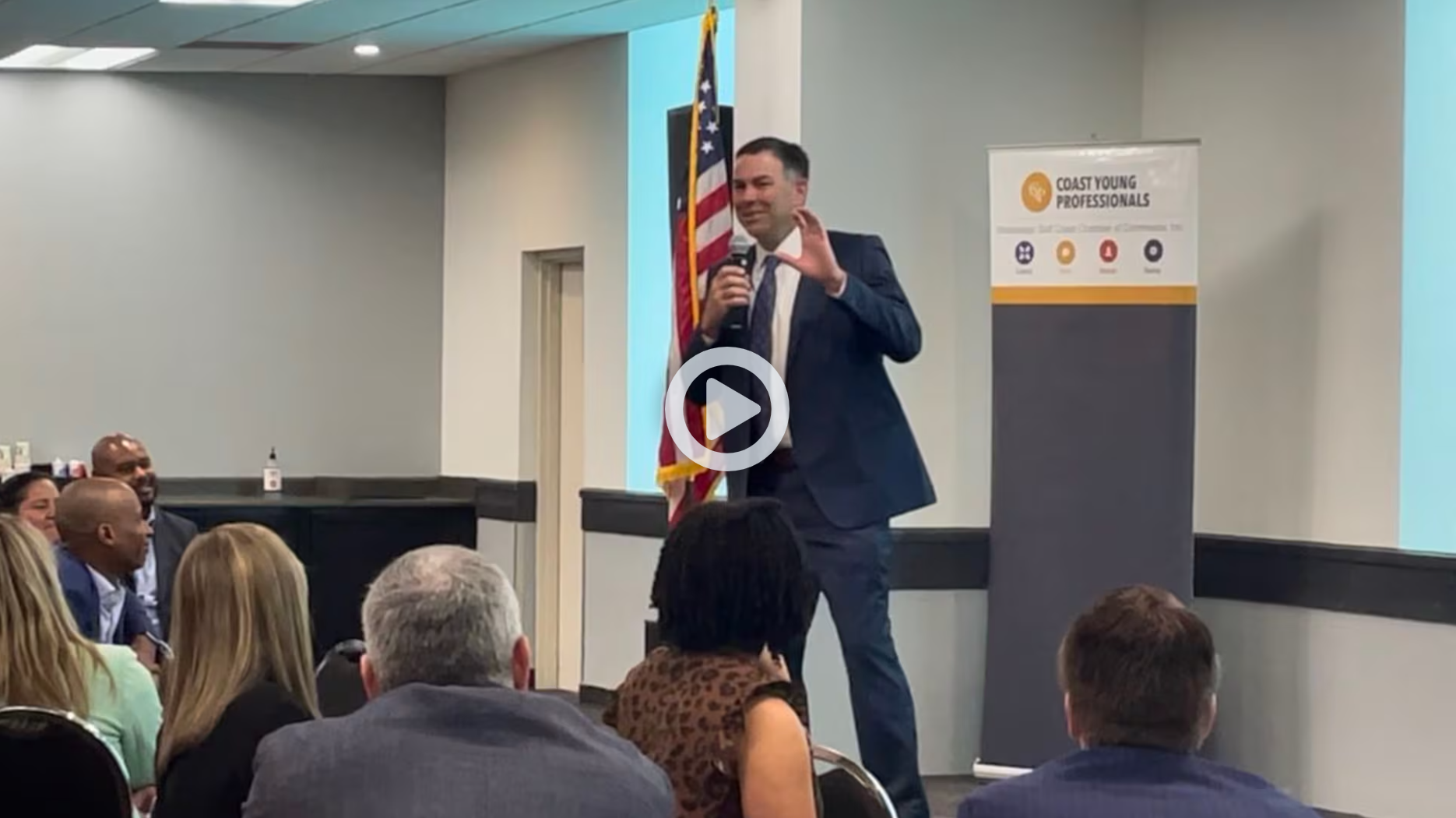
JACKSON, Miss. (WLBT) -Just because you’re trained to do a certain job doesn’t mean you can start right away. Several professions require a license in Mississippi.
“When government is standing in the way of people working, we’ve got a problem,” explained Secretary of State Michael Watson.
There’s a total of 29 occupational licensing boards and commissions in Mississippi, and Secretary of State Michael Watson’s office is splitting that list up to put a microscope on the red tape they put between people and a license.
“Let’s just take the average. You got roughly 600 regulations that you as a small business person, if you’re working in one of these areas, one of these boards or commissions, you got to overcome 600 regulations just to operate to open your doors,” added Watson. “That’s time-consuming [and] it takes a lot of money. So we want to do all we can to cut those.”
Watson’s office visited one of those boards last week, and they didn’t have enough people there to do their business.
“This is the second time this board did not make quorum,” explained Watson. “And we had a number of licensees or prospective licensees that have been waiting for months for the license, and that’s bad.”
Sen. Jeremy England says he thinks licensing is an issue the legislature should keep a close watch on each year.
“Everybody talks about how important workforce development is,” noted England. “But what we don’t realize is once we get people through certain programs, they may have trouble getting their license.”
He filed a bill in 2021, and a similar House version was passed that removed the requirement for professional licenses for those who offer low-risk beauty services like eyebrow threading.
“We’re keeping people that want to work from working, and we can’t do that here in Mississippi,” added England.

( Mississippi Business Journal) - If you’re sometimes frustrated with government red tape, you’re not alone.
The Mississippi Secretary of State’s office is working on a solution; it’s called the Tackle the Tape initiative, and it was launched in July 2020.
“It was a priority for me after being elected secretary of state in 2019 to get this initiative off the ground quickly and to begin making a difference for Mississippians and small businesses alike,” said Secretary of State Michael Watson. “At the launch of Tackle the Tape, Mississippi had just been ranked as the most regulated state in the Southeast and among the most regulated states in the nation per capita. Our state’s administrative code consisted of over 9.3 million words and over 118,000 restrictions.”
Watson says that didn’t sit right with him, and he wanted something to be done.
“The regulatory burden is a growing issue federally and in states all across the country. I knew we could set an example for the rest of the nation by taking a serious, proactive approach to getting government out of the way while still upholding and maintaining the public health and safety of our citizens,” he recalled.
The initiative was launched with the goal of cutting anti-competitive government regulations and increasing economic opportunities for Mississippians by encouraging innovation, competition and job growth, essentially getting government out of the way while still upholding public health and safety.
“We can continue building on our state’s recent economic growth and increase prosperity for all Mississippians,” Watson said.
“It's no surprise that most Mississippians view interacting with the government as a burden and hurdle to living their lives or starting a small business,” said Colby Williams, Tackle the Tape program lead. “It’s been rewarding to see how our efforts have directly resulted in more Mississippians being able to start small businesses, create jobs, and generally prosper and thrive. I’m optimistic about our state’s future.”
According to Watson, Tackle the Tape helps Mississippians by reducing the costs and unnecessary hurdles created, whether intentionally or not, by state government — from cutting various licensing fees or making it easier to move to Mississippi with a license from another state to something as simple as allowing online submission of documents for licensees.
“Tackle the Tape focuses on making it easier to live and do business in Mississippi without unnecessary burdens from the government no matter how large or small the issue may be,” he said.
Since launching Tackle the Tape, the Secretary of State’s office says it has received overwhelming support from state legislators, agencies, licensees, small business owners and even other states’ elected officials interested in replicating similar red tape reduction efforts in their state.
Licensing boards in other states have embraced Tackle the Tape and have started bringing their own suggested regulation cuts to the table for review, citing Mississippi’s efforts as their reason for doing so.
“We also recently won the 2023 National Association of Secretaries of State (NASS) IDEAS award which showcases the best innovative programs from states across the country,” Watson said. “Tackle the Tape has been receiving national attention since shortly after its launch.”
While there have been numerous successes, including a long list of individuals the team has helped walk through various issues with state government, it highlights how important this initiative has been for not only Mississippians but for citizens across the country who feel the burden over outdated, anti-competitive regulations, Watson said.
“I’d like to add that because of the overwhelming response to Tackle the Tape, we decided to create a strategic road map to increase the efficiency of our regulatory review process called 29 by 29. 29 by 29 serves as a strategic plan to drive Tackle the Tape’s reviews of all 29 of our state’s licensing boards and commissions by the year 2029,” Watson said. “We have brought together nonprofits, academics, relevant industry experts and even college students from each prospective industry to contribute input in our reviews. Far too often the government thinks it knows what is best for the people, and we wanted to ensure our red tape reduction efforts were including experts in the fields actually being regulated.”
The secretary noted that the Tackle the Tape website is a great resource for keeping up with these efforts and for submitting a regulation that you may be having issues with for the team to review.
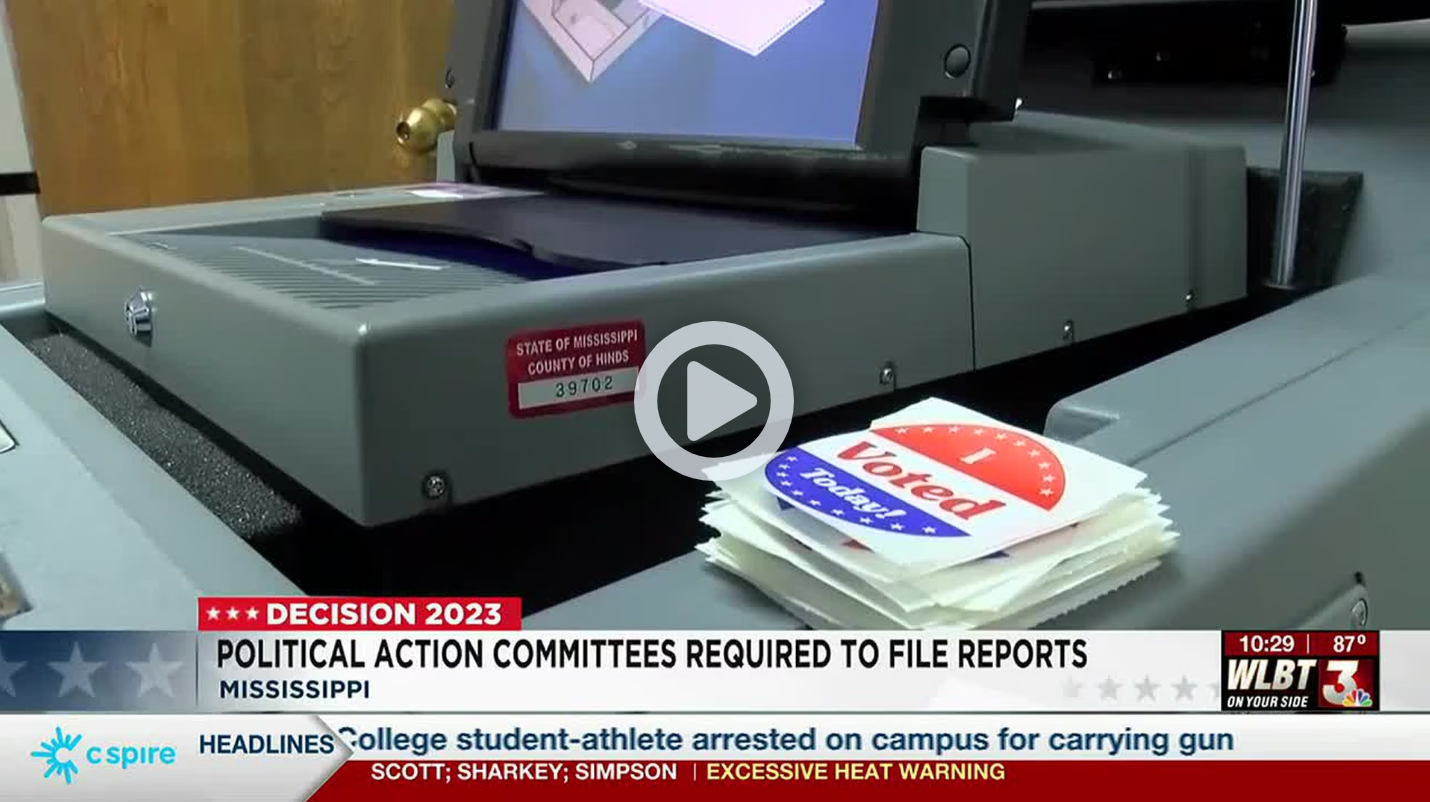
JACKSON, Miss. (WLBT) - Chances are you aren’t trying to read the fine print at the end of political ads. And you may even just assume they’re all from the candidate’s campaigns.
But, a lot of those are from political action committees. Now, there are questions about how to ensure they’re held accountable.
Secretary of State Michael Watson sounded the alarm about campaign finance at Wednesday’s Grip-N-Grin event.
“I want you to understand something,” said Watson. “49 PACs did not file yesterday that have spent money in Mississippi. That’s important to make sure that you understand who’s spending money, and who’s saying what, understanding where that money is coming from, and why that’s playing in Mississippi.”
As of 3:15 p.m. on Thursday, there were still 38 outstanding reports from PACs according to the Secretary of State’s office.
Mississippi College political science professor Dr. Glenn Antizzo notes that donations to political action committees ( read more at WLBT.com).
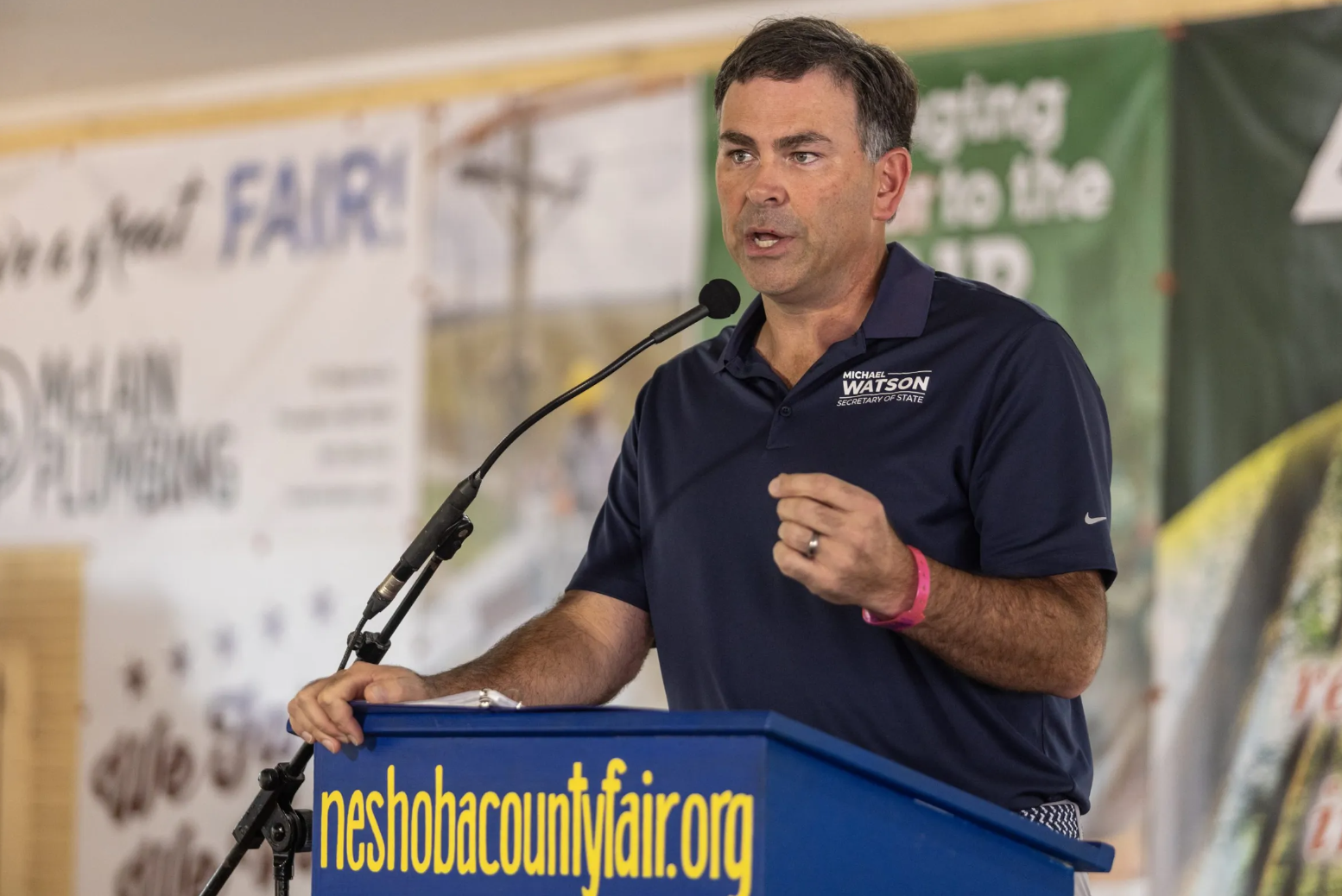
NESHOBA COUNTY FAIR — Incumbent Republican Secretary of State Michael Watson on Thursday vowed to reform Mississippi’s lax campaign finance and lobbying reporting and nearly nonexistent enforcement of laws if reelected.
He also vowed in his Neshoba County Fair speech to do away with politicians’ “legacy” campaign finance accounts — money still held in accounts under pre-2018 rules that allowed politicians to spend campaign money however they want and pocket the money when they leave office.
Watson’s Democratic opponent, Shuwaski Young, on Thursday at the fair also called for campaign finance reform, as did incumbent Republican Lt. Gov. Delbert Hosemann on Wednesday.
This statewide election cycle has seen several claims of campaign finance law or reporting requirement violations. It has also shown what appears to be a reluctance by ( continue reading on Mississippi Today)
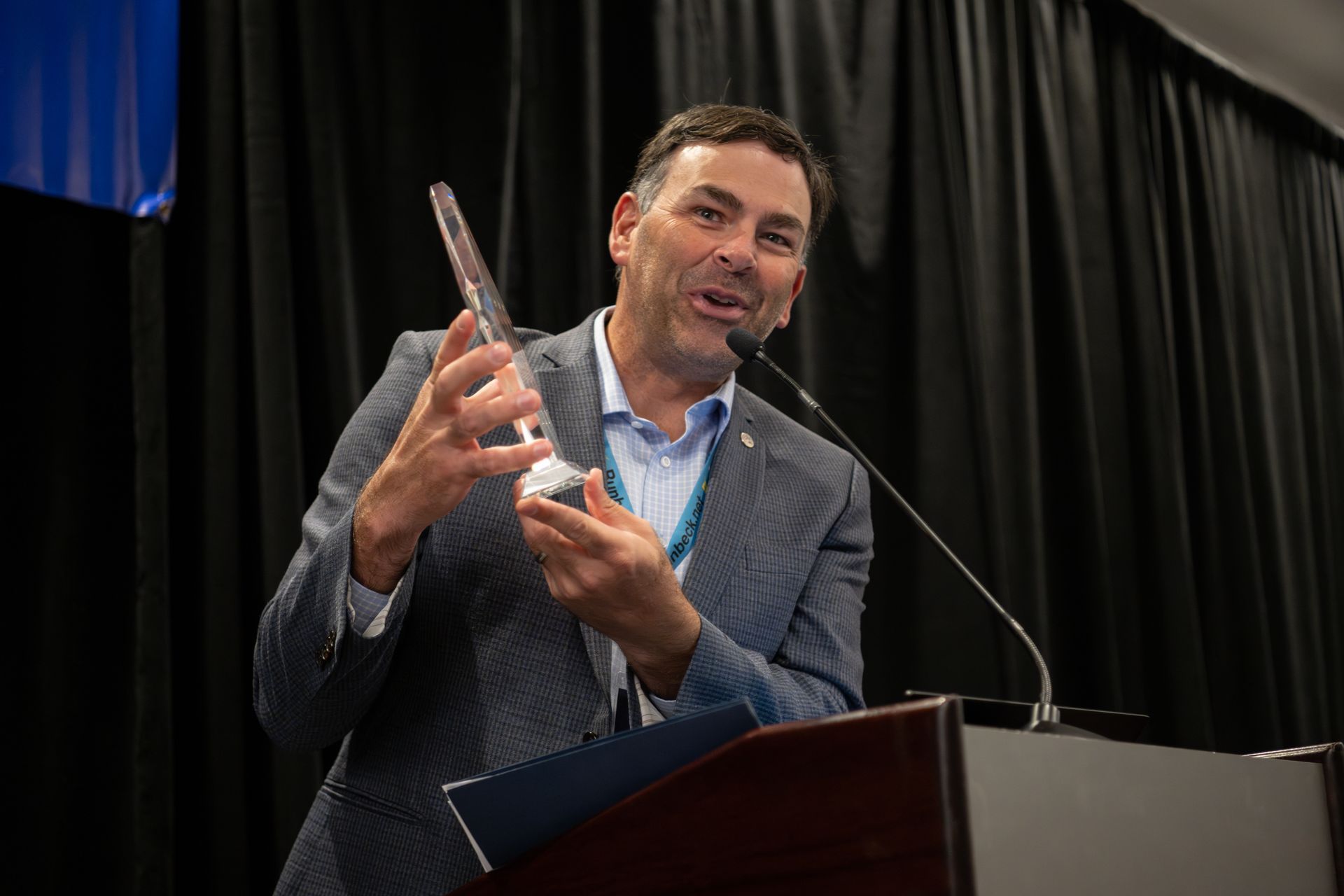
WASHINGTON, D.C. – The members of the National Association of Secretaries of State (NASS) have selected the Mississippi Secretary of State’s Office as the 2023 IDEAS (Innovation, Dedication, Excellence and Achievement in Service) Award recipient.
Launched in July 2020, Mississippi’s Tackle the Tape initiative seeks to cut complicated government “red tape” rules and regulations, which may prolong business processes, especially for small businesses. By doing so, the program seeks to increase economic opportunities for individuals across Mississippi by encouraging innovation and job growth. The office worked in partnership with the Occupational Licensing Review Commission, other state agencies, small businesses, and industry leaders across Mississippi.
“I’m extremely honored to have been selected as the 2023 NASS IDEAS Award winner. To be chosen among the other outstanding innovative initiatives speaks to the power of Tackle The Tape and the regulatory reform happening in Mississippi. I’m grateful to my colleagues for this recognition and look forward to continuing to use this initiative to promote business development and prosperity for all Mississippians,” said Mississippi Secretary of State Michael Watson.
“I was proud to present my colleague and friend, Secretary Watson, with this year’s IDEAS Award, which showcases the best programs states have to offer,” said NASS President and Kansas Secretary of State Scott Schwab.
The award was presented to Watson by Schwab on Tuesday, July 11, during the NASS 2023 Summer Conference in Washington, D.C. Secretary of State Offices in Iowa and Minnesota were also recognized for their finalist submissions.
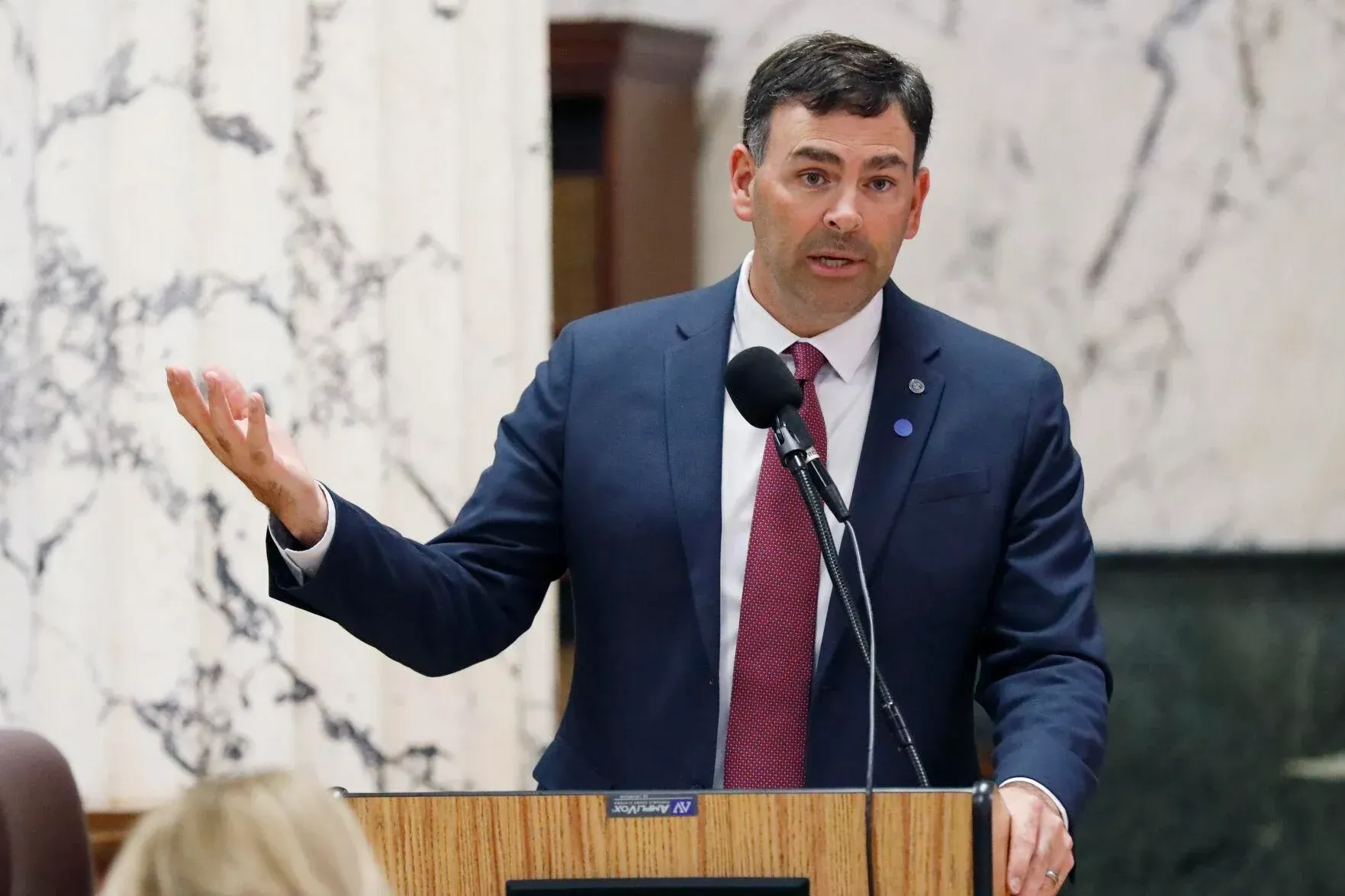
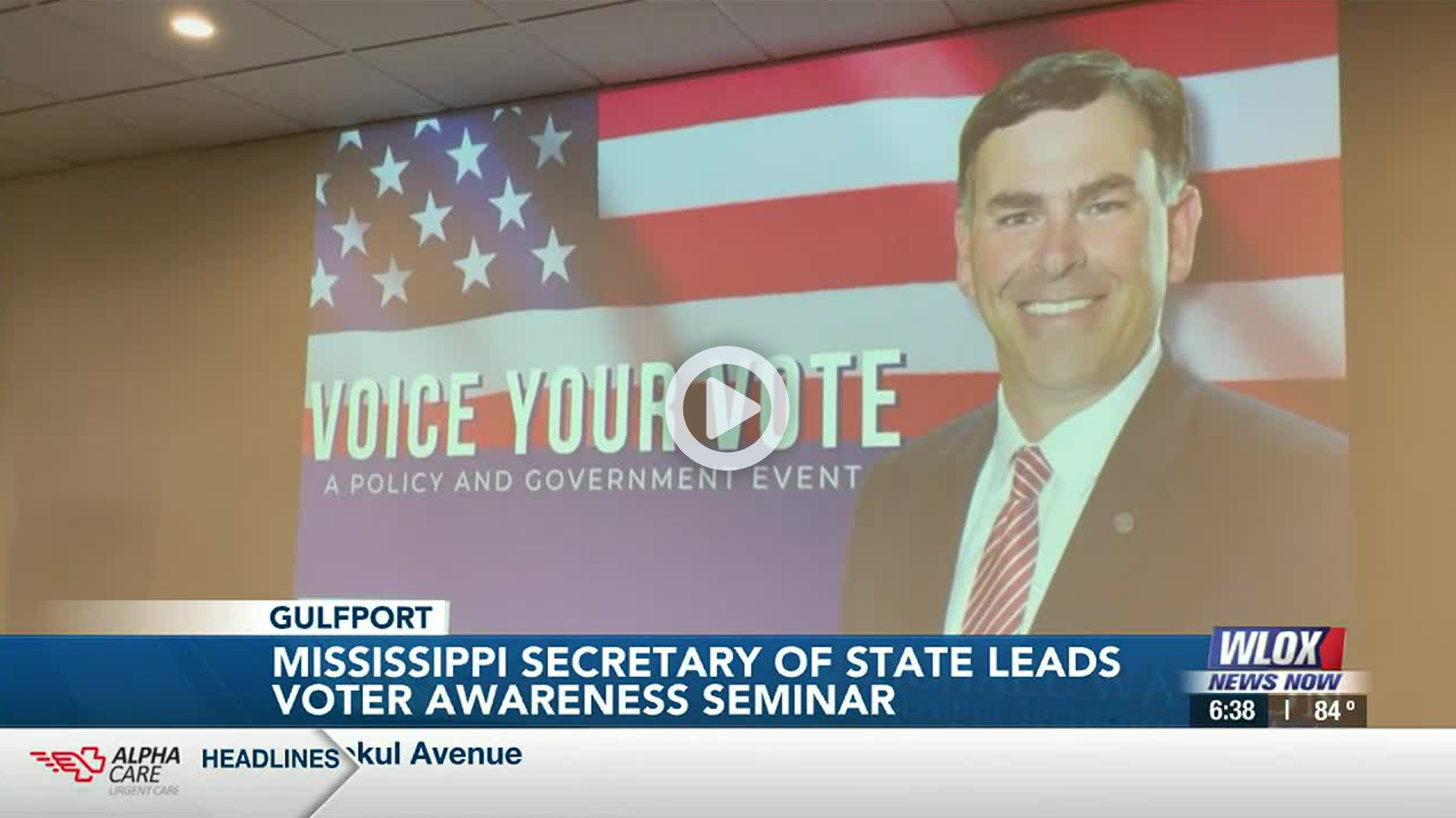
GULFPORT, Miss. (WLOX) - Mississippi Secretary of State Michael Watson is touring the state to promote his “voice your vote” initiative.
Watson visited the Gulf Coast on Tuesday at the Knight Nonprofit Center in Gulfport.
The Pascagoula native is making efforts to increase voter registration after describing the overall turnout across the state as “ discouraging ” in 2022.
The two-hour policy and government seminar aimed to give attendees a better understanding of the ins and outs of the voting process and an overview of how state and local elections work.
Watson said the Coast has had some of the highest voter participation in the state in previous years.
“I think you see a very engaged population here,” he said. “So many things are happening on the Coast. There’s always something new going on; I think that kind of helps gain attention. The Coast is strong right now so having their voice heard even more strongly at the polls is really important for the whole Coast to move the state forward.”
Gulfport Mayor Billy Hewes and Pass Christian Mayor Jimmy Rafferty were among those in attendance at the seminar. The event was sponsored by Mississippi Power, Hancock Whitney, and Balch & Bingham LLP.

(Magnolia Tribune)- Among the legislation passed during the 2023 Legislative session were Senate Bill 2358 , House Bill 1306 , and House Bill 1310 , all pertaining to securing elections in Mississippi.
While S.B. 2358 and H.B. 1306 have been signed by the Governor, H.B. 1310 is still awaiting approval.
Mississippi Secretary of State Michael Watson said clean and fair elections are the cornerstone of our democracy.
“I’m proud of our work with the Legislature during the 2023 session to further preserve the integrity of Mississippi elections,” Secretary Watson said.
Secretary Watson explained that with the passage of S.B. 2358, ballot harvesting is prohibited with a few exceptions for family members, mail carriers, and the like while H.B. 1306 provides for penalties for fraudulently requesting absentee ballots. It also seeks to strengthen transparency in campaign finance reporting. Any candidate who does not file all campaign finance reports required in the last five years is prohibited from running for office.
“Awaiting the Governor’s signature is H.B. 1310, or our election integrity package,” Watson said. “Through this bill, we have been granted authority to conduct post-election audits, expanded procedures to ensure only U.S. citizens are voting in Mississippi elections, secured funding for enhanced cybersecurity, and codified methods to better maintain voter rolls.”
“With these additional safeguards, our goal is to restore confidence in the voting process and reaffirm to Mississippians their vote is the one they cast,” Watson concluded.
Senate Bill 2358
Signed by Governor Tate Reeves, the legislation bans ballot harvesting in the state of Mississippi.
Ballot harvesting is the practice of a third-party picking up or collecting a voter’s absentee ballot and delivering it to a polling place or a clerk’s office. Such collection is often performed by political operatives or organizations.
S.B. 2358 also states that a person shall not knowingly collect and transmit a ballot that was mailed to another person and outlines the individuals that are exempted:
- An election official while engaged in official duties as authorized by law.
- An employee of the United States Postal Service while engaged in official duties as authorized by law.
- Any other individual who is allowed by federal law to collect and transmit United States mail while engaged in official duties as authorized by law.
- A family member, household member, or caregiver of the person to whom the ballot was mailed.
- A common carrier that transports goods from one place to another for a fee. No parcel shall contain more than a single ballot.
In signing the bill, Governor Reeves explained that ballot harvesting is where bad actors can take advantage of vulnerable voters and circumvent the election process.
“This process is an open invitation for fraud and abuse and can occur without the voter ever even knowing,” Reeves said. “Across the country, we’ve seen how bad actors have used ballot harvesting to take advantage of elderly and vulnerable voters in other states, all so they can try to circumvent our democratic process and cut you out of it. But here in Mississippi, we’re just not going to let that happen. Here, we will make it easy to vote and hard to cheat.”
Governor Reeves said “we reject attempts to cheat and we reject ballot harvesting.”
“We demand election integrity and we demand accountability. In fact, 87% of all Americans oppose ballot harvesting. I stand with the vast majority of Mississippians and with the vast majority of Americans,” Reeves said. “And as long as I’m governor, Mississippi will continue to take a strong stand in defense of our elections so that we can ensure complete confidence in the results.”
House Bill 1310
Passed by the Mississippi Legislature and awaiting the Governor’s signature, Secretary Watson said H.B. 1310 allows for post-election audits, adds new tools for counties to conduct voter roll maintenance, provides additional election support funding for counties, and expands procedures to ensure only U.S. citizens vote.
“Appreciate Rep. Brent Powell’s good work on H.B. 1310 and thankful for Lt. Gov. Hosemann, Sen. Jeff Tate, Rep. Price Wallace, and Speaker Gunn shepherding it through the legislature,” Watson said. “Clean and fair elections are the cornerstone of our democracy. We’ve been working on pieces of this election integrity package from day one. Extremely proud to see through to the finish line.”
House Bill 1306
Signed by Governor Reeves on March 28, 2023, H.B. 1306 revises “certain provisions about names of candidates appearing on the ballot, judicial candidate’s annual report, and fraudulent absentee voter applications.”
“Through our work with HB 1306, candidates running for all offices will be prevented from appearing on the ballot if they have not filed their campaign finance reports in the last 5 years,” Secretary Watson said. “Transparency & accountability are fundamental components of the elections process.”
Watson said H.B. 1306 also assists District Attorneys with prosecutorial authority by providing penalties for fraudulently requesting or submitting an absentee ballot application.
“Great team effort with our legislators to continue making it easier to vote and harder to cheat!” Watson added.
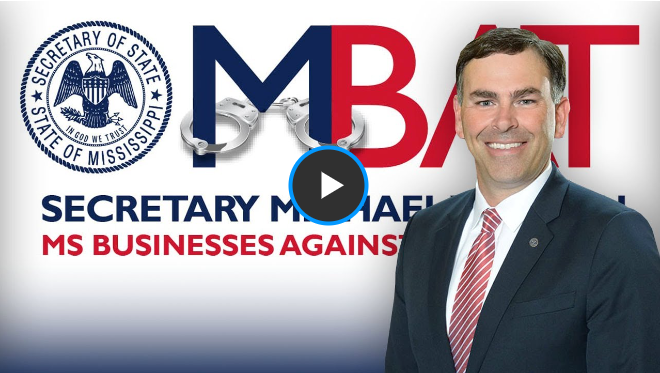
JACKSON, MISS. (Clarion-Ledger) - Every year, some 24.9 million people worldwide fall victim to human trafficking, according to the U.S. Department of State.
"In the United States, traffickers compel victims to engage in commercial sex and to work in both legal and illicit industries and sectors," according to Mississippi Businesses Against Trafficking, an initiative established by Mississippi Secretary of State Michael Watson.
Watson, held a Mississippi Businesses Against Trafficking Summit on Tuesday, April 4, with students, Criminal Justice officers, Human Trafficking prevention groups and a panel of experts in the field at Jackson State University to discuss ways to prevent sex trafficking and other forms of human exploitation in Mississippi.
Watson said the idea for the Summit started when he saw the devastation caused by sexual exploitation in other states and that it was growing too close to home.
"When I served as … state senator, I received multiple calls about possible incidents of trafficking in Mississippi," Watson said.
The stories he heard touched his heart, he said, so he created the Mississippi Businesses Against Trafficking intitiative to help prevent trafficking crimes in Mississippi.
"We aim to spread awareness and let people know what is happeningm" Watson said. "Since the program's start in 2022, we now have over 100 members serving Mississippi. MBAT is also training for employees to know how to recognize signs of trafficking."
Watson said the first Mississippi Businesses Against Trafficking Summit was held at the University of Southern Mississippi earlier this year, with approximately 150 people in attendance.
"… It is our job to recognize signs of trafficking regardless of the location," Watson said.
The summit was presented in collaboration with sponsors including the Mississippi Bureau of Investigation, the Mississippi State Department of Health and the Jackson State University Police Department.
Speakers for the summit included JSU criminal justice professor Lt. Kevin Lavin, Brian Montgomery, father of deceased sextortion victim Walker Montgomery , and Interim President of JSU Elayne Hayes-Anthony, Ph.D.
During the summit, Watson invited Montgomery to speak about losing his 16-year-old son, Walker, to sexual exploitation in December last year.
Brian told attendees that he feels as if he failed his son by not being more aware of the possible signs of exploitation and has since gone public with the tragedy to warn teens and parents alike of the danger that lurks within social media apps.
Panelists for the event were Executive Director at the Louisiana Governor's Office of Human Trafficking Prevention Dr. Dana Hunter; Mississippi Statewide Human Trafficking Coordinator Ashlee Lucas; Vice President Dutch Oil Company/Sprint Mart Matt Bogue; who answered questions from the audience.
Anthony said the summit is essential to the community and JSU students.
"We are very pleased to be a part of this summit and want our community to remain safe by ensuring the appropriate knowledge is given," Anthony said in opening the summit. "On behalf of the university, I'd like to thank those here and the messages that will be given today. I thank Chief Herman Horton, JSU Police Chief, for connecting with the Secretary of State to bring this event together. I am big on partnerships and the things that make us great. This is one."
Lavin said his military background and 33 years of law enforcement have helped him identify numerous signs of sex trafficking.
"Currently, I work as a Lieutenant with the Hinds County Sheriff's Department, and we handle street crime and often run into sex trafficking cases in Jackson," Lavin said. "This issue is something we can't police our way out of; we need our community leaders to help us bring factual information to share with our churches, communities and children. Human trafficking is one of the most serious crimes you can commit, although it varies by year for different states."
Lavin said children aren't exempt from sex trafficking and should be monitored as much as adults.
"Regardless of your age, gender or sexual orientation, everyone is a possible desired prospect in the sex trafficking world," Lavin said. "Often predators prey on those who appear malnourished, injured, lack personal identification documents and personal possessions."
Below is a list of Human Trafficking Resources to reach out to if you have questions about human trafficking:
Center for Human Trafficking Research and Training
- Dr. Tamara Hurst, Co-founder and Co-Director, Tamara.Hurst@usm.edu. Phone: 601-266-4173
- Dr. Kimberly Hogan, Co-Founder and Co-Director, K.Hogan@usm.edu. Phone: 601-266-4731
- For more information, follow www.usm.edu/chrt.
Center for Violence Prevention
Child Protection Services for Child Sex, Labor Trafficking, Abuse or Neglect.
- Phone: 888-222-8000
Department of Homeland Security
Mississippi Bureau of Investigation
- Ashlee Lucas, MBI Statewide Human Trafficking Coordinator, ReportHT@dps.ms.gov.
- Phone: 601-987-1671
- www.dps.ms.gov/humantrafficking
Mississippi Businesses Against Human Trafficking
Mississippi State Department of Health/Human Trafficking Program Navigators
- Xavier Johnson, Navigator, Xavier.Johnson@msdh.ms.gov, Phone: 601-206-1547.
- Crystal Palmer, Navigator, Crystal.Palmer@msdh.ms.gov, Phone: 601-206-1554
Mississippi Human Trafficking Council
- www.dps.ms.gov/humantrafficking
- Follow on Facebook: www.facebook.com/mississippihumantraffickingcouncil
National Human Trafficking Hotline
- Phone: 888-373-7888 or text BEFREE (233733). You have the option to remain anonymous.

